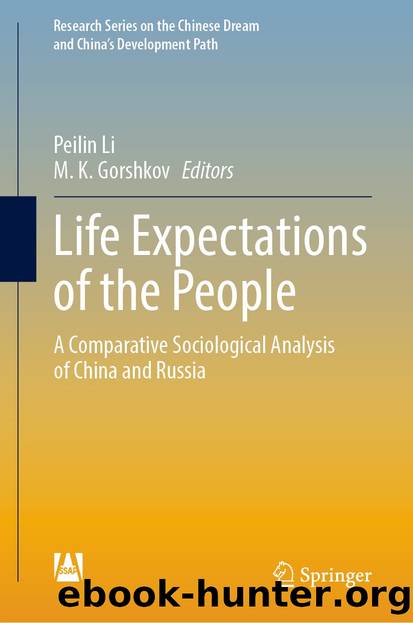Life Expectations of the People by Unknown

Author:Unknown
Language: eng
Format: epub
ISBN: 9789811625053
Publisher: Springer Singapore
Figure 10.1 shows that the nationâs perceptions have been rather stable in this respect. In the past 15 years, the share of those who preferred the social equality model remained at about 65% (among those who answered the question), while those who prefer individual freedom make up about one-third of Russian society.
This does not mean that freedom is not important for Russians (on the contrary: according to survey data, two-thirds of the population agree that life is meaningless if there is no freedom); this means that the issue of equality (which is related to justice) is perceived as a pressing one for modern Russian society. Russians are not committed supporters of full equality, yet a social model based on individual freedom does not seem to be too appealing to them either, since many of them associate individual freedom with permissiveness and overindulgence (which is not surprising, considering that in 2011, 64% of Russians said that freedom was, in their opinion, an opportunity to be oneâs own master).
However, while striving for equality, Russians more often mean the equality of opportunity (68% of the respondents in 2013) than about equality of income (32%). These ratios have been rather stable in the past decade across all age groups, despite minor fluctuations. Therefore, we can say that preference for social equality is a persistent Russian cultural norm. Thus, when speaking about social justice, two-thirds of the respondents imply the concept of equality of opportunity rather than the equality of income or living standards.
It is necessary to understand to what degree the present-day situation in Russia matches peopleâs ideas of a just, fair society. Since the notion of justice is so important in Russia, the evaluation of the present-day situation (i.e., the current level of justice in society) is in a way definitive for the nationâs social well-being and stress levels, and can impact the level of social tension. In this context, a serious negative indicator must be mentioned: in 2012, a large majority (83%) of the population under 55 agreed that income inequality in Russia was too high, two-thirds agreed that the system of property distribution was unfair, and the same share agreed that people were inadequately rewarded for their skills and qualifications. Nearly half of Russians (54%) also believed that they personally received inadequate remuneration due to being over-qualified or working in arduous conditions (see Fig. 10.2).
Fig. 10.2Income distribution and property distribution as perceived by Russians, 2012, %8
Download
This site does not store any files on its server. We only index and link to content provided by other sites. Please contact the content providers to delete copyright contents if any and email us, we'll remove relevant links or contents immediately.
Kathy Andrews Collection by Kathy Andrews(10507)
The remains of the day by Kazuo Ishiguro(7542)
Spare by Prince Harry The Duke of Sussex(4188)
Paper Towns by Green John(4163)
The Body: A Guide for Occupants by Bill Bryson(3789)
Be in a Treehouse by Pete Nelson(3206)
Harry Potter and the Goblet Of Fire by J.K. Rowling(3025)
Goodbye Paradise(2949)
Never by Ken Follett(2872)
Into Thin Air by Jon Krakauer(2695)
The Remains of the Day by Kazuo Ishiguro(2614)
The Genius of Japanese Carpentry by Azby Brown(2602)
The Cellar by Natasha Preston(2592)
Drawing Shortcuts: Developing Quick Drawing Skills Using Today's Technology by Leggitt Jim(2528)
120 Days of Sodom by Marquis de Sade(2428)
Architecture 101 by Nicole Bridge(2348)
The Man Who Died Twice by Richard Osman(2289)
Machine Learning at Scale with H2O by Gregory Keys | David Whiting(2264)
Fairy Tale by Stephen King(2058)
